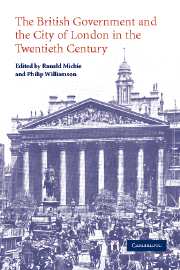Book contents
- Frontmatter
- Contents
- Notes on contributors
- Acknowledgements
- Conventions and abbreviations
- Introduction
- Part I The long perspective
- 1 The City of London and government in modern Britain: debates and politics
- 2 The City of London and the British government: the changing relationship
- Part II Markets and society
- Part III Government and political parties
- Part IV The interwar period
- Part V 1945–2000
- Select bibliography
- Index
2 - The City of London and the British government: the changing relationship
Published online by Cambridge University Press: 04 July 2009
- Frontmatter
- Contents
- Notes on contributors
- Acknowledgements
- Conventions and abbreviations
- Introduction
- Part I The long perspective
- 1 The City of London and government in modern Britain: debates and politics
- 2 The City of London and the British government: the changing relationship
- Part II Markets and society
- Part III Government and political parties
- Part IV The interwar period
- Part V 1945–2000
- Select bibliography
- Index
Summary
An unchanging relationship between unchanging partners: this is how the relationship between the City of London and the British government has tended to be painted. Although this simplification aids interpretation of a long time period, it also distorts understanding. There was nothing constant about either the government or the City during the twentieth century, and so it would be remarkable if the relationship between the two did not change. Government was transformed during the century, emerging as the dominant force within British economic and social life. The City of London was also transformed as it shed its commercial and imperial past to focus on finance and Europe. Under these circumstances the relationship between the City and government could not remain static. At the same time both existed within, and had to adapt to, a global economy that forced changes as a result of two world wars, a world depression and the rise and fall of managed national economies. This chapter seeks to trace and understand the City–government relationship over the past three centuries, focusing particularly on its intensity, and on the direction and limits of influence.
The origins of the relationship, 1700–1914
The City of London's leading institutions owed their very existence to the financial needs of the British government.
- Type
- Chapter
- Information
- Publisher: Cambridge University PressPrint publication year: 2004
- 6
- Cited by



